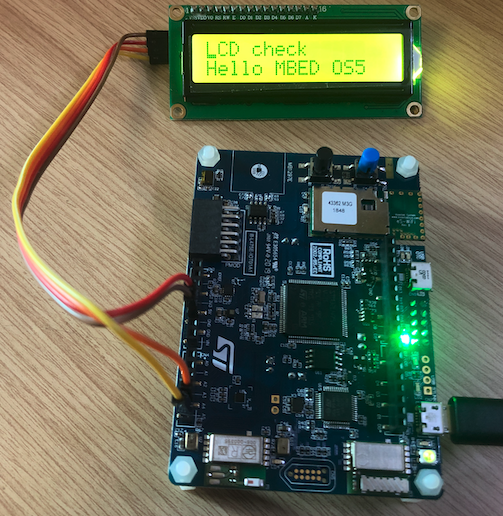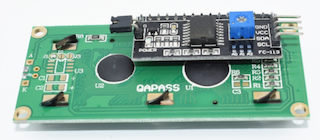Initial setup for FC-113 controller of TextLCD(1602A)
This example is a simple use case for the user of Text LCD with the FC-113 controller, based on Mbed OS 5.
Note that PCF8574T has Mbed base addresses 0x40 ~ 0x4E, while PCF8574AT has base addresses 0x70 ~ 0x7E.
I used 0x4E for Text LCD with the FC-113 controller.


If you need to fine-tune the Text LCD or using another type the TextLCD, please see here.
Diff: main.cpp
- Revision:
- 7:9fcc3c0acd50
- Parent:
- 2:b60cb847489c
--- a/main.cpp Wed Sep 13 11:30:50 2017 +0000
+++ b/main.cpp Tue Dec 24 05:30:57 2019 +0000
@@ -1,12 +1,56 @@
#include "mbed.h"
+#include "TextLCD.h"
+
+// I2C Communication
+I2C i2c_lcd(A4,A5); // SDA, SCL - I2C3
+
+// SPI Communication
+//SPI spi_lcd(p5, NC, p7); // MOSI, MISO, SCLK
-DigitalOut myled(LED1);
+//TextLCD lcd(p15, p16, p17, p18, p19, p20); // RS, E, D4-D7, LCDType=LCD16x2, BL=NC, E2=NC, LCDTCtrl=HD44780
+//TextLCD_SPI lcd(&spi_lcd, p8, TextLCD::LCD40x4); // SPI bus, 74595 expander, CS pin, LCD Type
+//TextLCD_I2C lcd(&i2c_lcd, 0x40, TextLCD::LCD16x2); // I2C bus, PCF8574 Slaveaddress, LCD Type
+TextLCD_I2C lcd(&i2c_lcd, 0x4E); // I2C bus, PCF8574(FC-113) Slaveaddress, LCD Type(1602A)
+
+//TextLCD_I2C lcd(&i2c_lcd, 0x42, TextLCD::LCD16x2, TextLCD::WS0010); // I2C bus, PCF8574 Slaveaddress, LCD Type, Device Type
+//TextLCD_SPI_N lcd(&spi_lcd, p8, p9); // SPI bus, CS pin, RS pin, LCDType=LCD16x2, BL=NC, LCDTCtrl=ST7032_3V3
+//TextLCD_I2C_N lcd(&i2c_lcd, ST7032_SA, TextLCD::LCD16x2, NC, TextLCD::ST7032_3V3); // I2C bus, Slaveaddress, LCD Type, BL=NC, LCDTCtrl=ST7032_3V3
-int main() {
- while(1) {
- myled = 1; // LED is ON
- wait(0.2); // 200 ms
- myled = 0; // LED is OFF
- wait(1.0); // 1 sec
- }
-}
+int main()
+{
+#if 0
+ pc.printf("LCD Test. Columns=%d, Rows=%d\n\r", lcd.columns(), lcd.rows());
+
+ for (int row=0; row<lcd.rows(); row++) {
+ int col=0;
+
+ pc.printf("MemAddr(Col=%d, Row=%d)=0x%02X\n\r", col, row, lcd.getAddress(col, row));
+// lcd.putc('-');
+ lcd.putc('0' + row);
+
+ for (col=1; col<lcd.columns()-1; col++) {
+ lcd.putc('*');
+ }
+
+ pc.printf("MemAddr(Col=%d, Row=%d)=0x%02X\n\r", col, row, lcd.getAddress(col, row));
+ lcd.putc('+');
+
+ }
+
+// Show cursor as blinking character
+ lcd.setCursor(TextLCD::CurOff_BlkOn);
+
+// Set and show user defined characters. A maximum of 8 UDCs are supported by the HD44780.
+// They are defined by a 5x7 bitpattern.
+ lcd.setUDC(0, (char *) udc_0); // Show |>
+ lcd.putc(0);
+ lcd.setUDC(1, (char *) udc_1); // Show <|
+ lcd.putc(1);
+#else
+ lcd.cls ();
+ lcd.setBacklight (TextLCD :: LightOn);
+ lcd.printf ("LCD check - online compile");
+ lcd.setAddress (0, 1);
+ lcd.printf ("Hello MBED\n");
+#endif
+}
\ No newline at end of file
 Daniel Lee
Daniel Lee